Are you wondering what’s the real deal about mineral sunscreen? You’re not alone. Nowadays, people are more concerned about the ingredients in the products they use on their skin, and sunscreens shouldn’t be an exception. That’s why we’ve invited a renowned dermatologist, Dr. Drayzday, to enlighten us on the truth about mineral sunscreens. In this post, you’ll discover everything you need to know about mineral sunscreen, from the benefits to the drawbacks, and how to choose the best one for your skin type. Get ready to bust some myths and learn some new facts!
The Truth About Mineral Sunscreen: Debunking Myths and Understanding the Science Behind Sun Protection
Introduction
The sun is a wonderful source of vitamin D, which is essential for bone health, among other benefits. However, overexposure to the sun can lead to sunburns, premature aging, and even skin cancer. This is why sunscreen is a must-have item for anyone who spends time outdoors. In a recent video, dermatologist @DrDrayzday discusses the differences between chemical and mineral sunscreens, debunks sunscreen myths, and delves into the science behind sun protection.
Chemical vs. Mineral Sunscreens
Many people are confused about the difference between chemical and mineral sunscreens. Chemical sunscreens contain active ingredients such as avobenzone and oxybenzone that absorb UV rays and convert them into heat. On the other hand, mineral sunscreens contain active ingredients such as zinc oxide and titanium dioxide, which create a physical barrier that reflects UV rays away from the skin.
Debunking Myths About Mineral Sunscreens
@DrDrayzday debunks the myth that mineral sunscreens only reflect UV rays. In fact, metal oxide sunscreens protect the skin by absorption, not by reflection or scattering. Also, some people believe that mineral sunscreens are not effective against UVA rays. However, this is not true. Zinc oxide sunscreens can provide broad-spectrum protection against UVA and UVB rays.
Why Sunscreen Doesn’t Work: 5 Myths Debunked
There are many myths surrounding sunscreen that can lead people to believe that sunscreen doesn’t work. @DrDrayzday debunks the following myths:
- Sunscreen is not necessary on cloudy days: UV rays can penetrate clouds and still cause damage to the skin.
- Sunscreen with a high SPF is better: SPF only indicates the level of protection against UVB rays, not UVA.
- Sunscreen is waterproof: water-resistant sunscreen can only provide protection for a certain amount of time while swimming or sweating.
- Sunscreen lasts all day: sunscreen needs to be reapplied every two hours, especially when exposed to sunlight or water.
- Darker skin does not need sunscreen: all skin types need protection from the sun.
Zinc Oxide Sunscreen: Not Toxic
One common concern about mineral sunscreens, particularly those that contain zinc oxide, is that it may be toxic. However, @DrDrayzday explains that zinc oxide is a safe and effective sunscreen ingredient that has been used for many years.
The History and Science of Sunscreen
Sunscreen drug products for over-the-counter human use were proposed in 1978 and finalized in 1999. Since then, many studies have shown the benefits of sunscreen in protecting the skin against harmful UV rays. The science behind sun protection involves the absorption and reflection of UV rays by active ingredients in the sunscreen product.
Conclusion
Understanding the differences between chemical and mineral sunscreens, knowing the truth behind common sunscreen myths, and learning about the science of sun protection can help us make informed decisions about our sun care habits. Remember to apply sunscreen every two hours, seek shade, and wear protective clothing to minimize sun damage.
FAQs
- Can I use mineral sunscreen on my face? Yes, mineral sunscreen is safe and effective for use on the face and body.
- Can I still get a tan while wearing sunscreen? Yes, sunscreen can help prevent sunburn and skin damage, but it does not prevent tanning completely.
- Can I use sunscreen on my baby? Yes, it is recommended to use a mineral-based sunscreen on babies older than six months.
- How much sunscreen should I apply? You should apply at least one ounce (about a shot glass full) of sunscreen to cover your entire body.
- Can I use sunscreen that has passed its expiration date? It is recommended to use sunscreen within its expiration date for optimal effectiveness.

